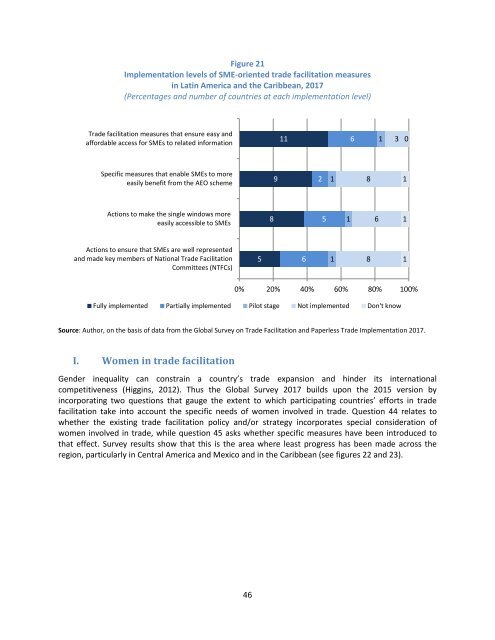Trade facilitation and paperless trade implementation in Latin America and the Caribbean: Regional Report 2017
The Global Survey on Trade Facilitation and Paperless Trade Implementation (“Global Survey”) is a global effort led by the Economic and Social Commission for Asia and the Pacific (ESCAP) in collaboration with all of the United Nations Regional Commissions, namely, the Economic Commission for Latin America and the Caribbean (ECLAC), the Economic and Social Commission for Western Asia (ESCWA), the Economic Commission for Africa (ECA) and the Economic Commission for Europe (UNECE). The goal of the Global Survey is to gather information from the member states of the respective United Nations Regional Commissions on trade facilitation and paperless trade measures and strategies implemented at the national and regional levels. The results of the survey will enable countries and development partners to better understand and monitor progress on trade facilitation, support evidence-based public policies, share best practices and identify capacity building and technical assistance needs.
The Global Survey on Trade Facilitation and Paperless Trade Implementation (“Global Survey”) is a global effort led by the Economic and Social Commission for Asia and the Pacific (ESCAP) in collaboration with all of the United Nations Regional Commissions, namely, the Economic Commission for Latin America and the Caribbean (ECLAC), the Economic and Social Commission for Western Asia (ESCWA), the Economic Commission for Africa (ECA) and the Economic Commission for Europe (UNECE). The goal of the Global Survey is to gather information from the member states of the respective United Nations Regional Commissions on trade facilitation and paperless trade measures and strategies implemented at the national and regional levels. The results of the survey will enable countries and development partners to better understand and monitor progress on trade facilitation, support evidence-based public policies, share best practices and identify capacity building and technical assistance needs.
You also want an ePaper? Increase the reach of your titles
YUMPU automatically turns print PDFs into web optimized ePapers that Google loves.
Figure 21<br />
Implementation levels of SME-oriented <strong>trade</strong> <strong>facilitation</strong> measures<br />
<strong>in</strong> Lat<strong>in</strong> <strong>America</strong> <strong>and</strong> <strong>the</strong> <strong>Caribbean</strong>, <strong>2017</strong><br />
(Percentages <strong>and</strong> number of countries at each <strong>implementation</strong> level)<br />
<strong>Trade</strong> <strong>facilitation</strong> measures that ensure easy <strong>and</strong><br />
affordable access for SMEs to related <strong>in</strong>formation<br />
11<br />
6<br />
1<br />
3<br />
0<br />
Specific measures that enable SMEs to more<br />
easily benefit from <strong>the</strong> AEO scheme<br />
9<br />
2<br />
1<br />
8<br />
1<br />
Actions to make <strong>the</strong> s<strong>in</strong>gle w<strong>in</strong>dows more<br />
easily accessible to SMEs<br />
8<br />
5<br />
1<br />
6<br />
1<br />
Actions to ensure that SMEs are well represented<br />
<strong>and</strong> made key members of National <strong>Trade</strong> Facilitation<br />
Committees (NTFCs)<br />
5<br />
6<br />
1<br />
8<br />
1<br />
0% 20% 40% 60% 80% 100%<br />
Fully implemented Partially implemented Pilot stage Not implemented Don't know<br />
Source: Author, on <strong>the</strong> basis of data from <strong>the</strong> Global Survey on <strong>Trade</strong> Facilitation <strong>and</strong> Paperless <strong>Trade</strong> Implementation <strong>2017</strong>.<br />
I. Women <strong>in</strong> <strong>trade</strong> <strong>facilitation</strong><br />
Gender <strong>in</strong>equality can constra<strong>in</strong> a country’s <strong>trade</strong> expansion <strong>and</strong> h<strong>in</strong>der its <strong>in</strong>ternational<br />
competitiveness (Higg<strong>in</strong>s, 2012). Thus <strong>the</strong> Global Survey <strong>2017</strong> builds upon <strong>the</strong> 2015 version by<br />
<strong>in</strong>corporat<strong>in</strong>g two questions that gauge <strong>the</strong> extent to which participat<strong>in</strong>g countries’ efforts <strong>in</strong> <strong>trade</strong><br />
<strong>facilitation</strong> take <strong>in</strong>to account <strong>the</strong> specific needs of women <strong>in</strong>volved <strong>in</strong> <strong>trade</strong>. Question 44 relates to<br />
whe<strong>the</strong>r <strong>the</strong> exist<strong>in</strong>g <strong>trade</strong> <strong>facilitation</strong> policy <strong>and</strong>/or strategy <strong>in</strong>corporates special consideration of<br />
women <strong>in</strong>volved <strong>in</strong> <strong>trade</strong>, while question 45 asks whe<strong>the</strong>r specific measures have been <strong>in</strong>troduced to<br />
that effect. Survey results show that this is <strong>the</strong> area where least progress has been made across <strong>the</strong><br />
region, particularly <strong>in</strong> Central <strong>America</strong> <strong>and</strong> Mexico <strong>and</strong> <strong>in</strong> <strong>the</strong> <strong>Caribbean</strong> (see figures 22 <strong>and</strong> 23).<br />
46


















